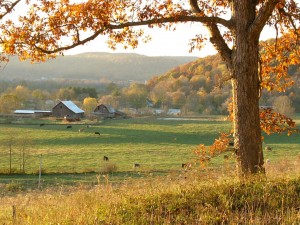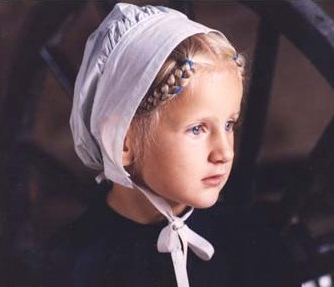The days of Jerusha’s childhood in Apple Creek, Ohio, had been good days, filled with the comfort of a stable family and the practice of her faith. Her family was Old Order Amish and she loved the ways of her people. The Hershbergers lived on one of the largest farms in Apple Creek. They had been in America for over two hundred years, since the “Plain People” accepted William Penn’s offer of religious freedom, and when the first Amish came to Pennsylvania from Switzerland in 1720 there had been Hershbergers among them. When the Amish moved west in the early 1800’s the Hershberger family had followed and they arrived in the village of Apple Creek in 1857. The land was fertile and open and greatly suited the Amish folk and their agricultural ways. The Hershberger family had homesteaded a tract of land outside the village and over the years they had purchased neighboring farms. Now they held over two hundred acres of the most fertile land in the township and Hershberger milk and cheese were renowned throughout Wayne County.
During her childhood, the rest of the nation was suffering through the Great Depression, and the Amish were not sheltered from the turmoil of those years. The difference for the Amish was that they were better at doing more with less. The Hershberger family and their neighbors simply pulled inward and depended on each other, so Jerusha grew up in an atmosphere of love, self-sufficiency and community. From time to time homeless men would wander through the village. They would be fed, given a place to rest, and then most would move on. There were no homeless among the Amish and Apple Creek remained an island of safety and prosperity in those troubled times.
 Jerusha loved the sense of continuity that pervaded every aspect of her young life. Her family could trace their roots all the way back to Jacob Amman and the original Amish who had broken with the Mennonites in 1693. They took pride in the fact that they still clung to the old ways, and they took great pains to separate themselves from the world and live quiet lives. Jerusha’s days were filled with the simple tasks of a farm girl, planting in the spring, tending the animals, cooking for her father and brothers as they harvested the corn and wheat. She watched her grandmother and mother can and preserve the garden produce and put up the fruit for the winter. They filled the root cellar with potatoes, onions and barrels of apples. Her father brought ice from the winter pond and packed it into the cold house, which was dug into the side of a hill behind the house. Then they prepared hams, chickens and sides of beef and stored them away for the festive dinners and holiday celebrations that were the hallmark of her youth. Jerusha’s father was an Armendiener, a deacon, and she loved to sit quietly while he read from the Bible during the Sunday meetings. The scriptures came alive to her as he read and his rich, baritone voice soothed her and filled her with a certainty that the God her family served could only be a good and loving God.
Jerusha loved the sense of continuity that pervaded every aspect of her young life. Her family could trace their roots all the way back to Jacob Amman and the original Amish who had broken with the Mennonites in 1693. They took pride in the fact that they still clung to the old ways, and they took great pains to separate themselves from the world and live quiet lives. Jerusha’s days were filled with the simple tasks of a farm girl, planting in the spring, tending the animals, cooking for her father and brothers as they harvested the corn and wheat. She watched her grandmother and mother can and preserve the garden produce and put up the fruit for the winter. They filled the root cellar with potatoes, onions and barrels of apples. Her father brought ice from the winter pond and packed it into the cold house, which was dug into the side of a hill behind the house. Then they prepared hams, chickens and sides of beef and stored them away for the festive dinners and holiday celebrations that were the hallmark of her youth. Jerusha’s father was an Armendiener, a deacon, and she loved to sit quietly while he read from the Bible during the Sunday meetings. The scriptures came alive to her as he read and his rich, baritone voice soothed her and filled her with a certainty that the God her family served could only be a good and loving God.
If God is anything like my daed, she often thought, then God must be wonderful.
When she was old enough, her father gave her the job of bringing home the milk cows every evening. Sometimes Jerusha would have to tramp for miles to find them, but she thoroughly enjoyed it. Like most farm children, she liked being alone. In those days, before World War II, the fields around Apple Creek were open to the horizon and there were many stands of trees with small creeks and ponds. Jerusha found great comfort in the simplicity of her life as she wandered through the fields and woods. Every so often she would see someone in an automobile far off in the distance driving along State Highway 30, or hear the train chugging along the tracks to parts unknown, its mournful whistle seeming to warn of the dangers and sorrows of a complicated modern world. At these times Jerusha would kneel down on the earth and touch the grass, or stop by a cold clear brook and dip her hands in the water, feeling the coolness on her skin and letting her thoughts focus on the power of a God who could create such beauty with a spoken word. She did not comprehend the deeper theological issues that surrounded her faith, nor did they really interest her. She only knew that at some time in the past, wise men had led her people away from the traps and pitfalls of a world that catered to the basest side of men’s natures and kept them from fixing their attention on this God of wonders that revealed himself to her in every wooded path and every spring flower.





This book sounds wonderful. When will it release to kindle or nook?
Thanks
Cathy
Cathy, the book will be released February 1, 2013. I will contact my publisher and see what the schedule for Kindle and Nook format releases will be. Thanks
Patrick
Looking forward to reading your book.
Need it for my kindle.
Keep up the wonderful writing.